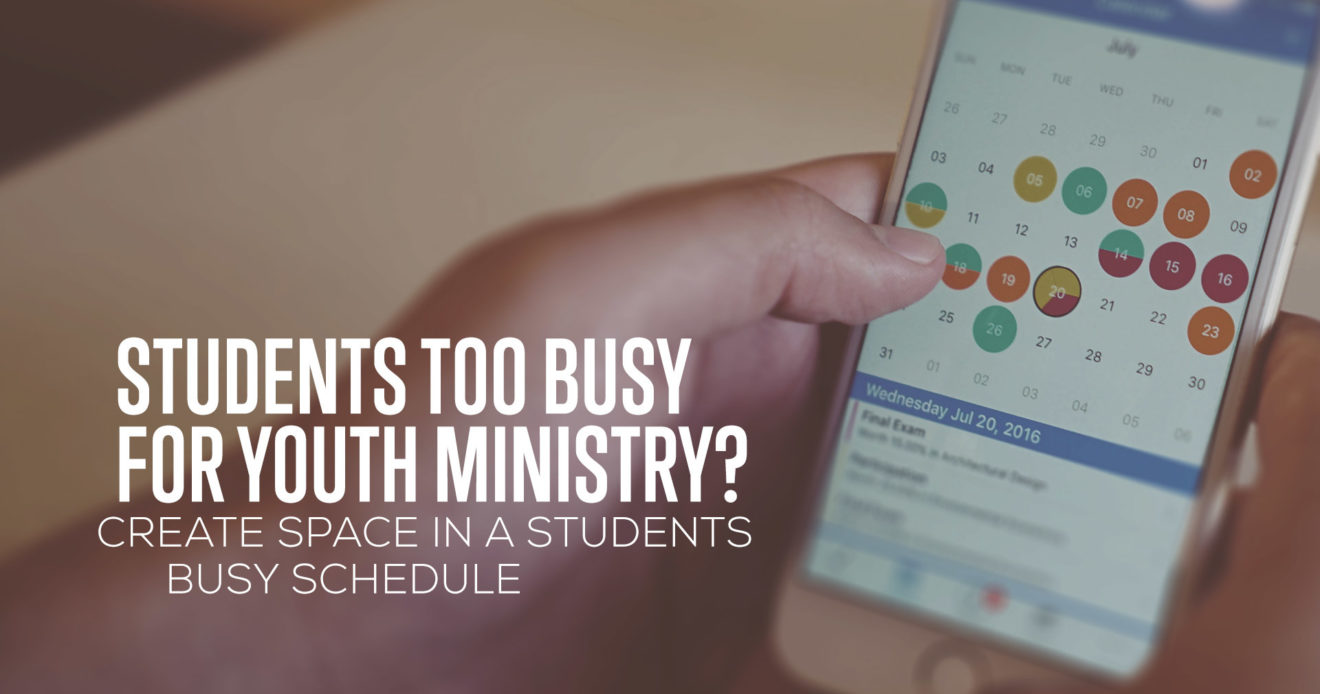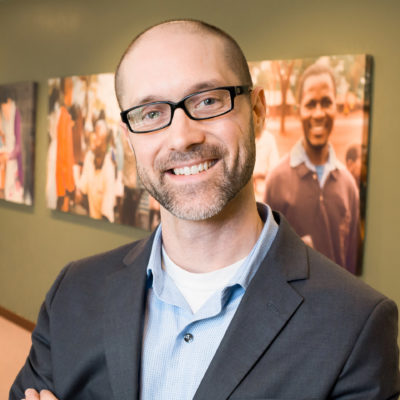
Students Too Busy for Youth Ministry?
In my early days of ministry, I was all for the big event. After all, go big or go home. Right? So, while teaching in a Christian school, I had this idea for a large youth event. I wasn't exactly sure what I wanted to see, but I did know that I wanted several great local worship bands and some great speakers. I found all the right people—the right bands and speakers, and the perfect venue. I even found most of the money I needed to break even. I gave it a name, had a video created to promote it and started selling tickets. I covered all the marketing basics. The tickets were affordable with built-in value. The event was on a night that most students were available. I even researched competing events to make sure I could maximize my attendance. I was convinced that this event was going to be awesome.
But people didn't buy tickets.
People didn't seem all that interested. Not even the students of my school. But I pressed forward. Faithful to what I thought God was asking of me. I was confident that God would get behind this and do something great.
People still didn’t buy tickets.
We had the event anyway. The venue could hold 1000 people, and I expected at least 500. We had about 80 students show up. I was the second to last speaker. Which means that I had to sit and stare at failure for an hour before I got up to deliver a message. I don’t remember exactly what I said, only that the message was about the power of community. I also remember having to tell the bands and the rest of the speakers that I couldn’t pay them.
After all was said and done, I did the appropriate reflecting on what had happened. In other words, I kept asking the question; what the heck just happened? Why didn’t people want to come? Why didn’t youth pastors and leaders want to promote it? What did I miss? Despite my best marketing efforts, I didn't consider that student are busy and even though I was hosting what I thought was a super cool Jesus event, maybe the students had someplace better to be.
Better than the church? Better than worship and teaching from the Bible?
Yup. I did nothing to attract them to the event or gain their attention. I gave them no reason to be there.
As much as we would like to ignore it and pretend otherwise; the church is failing at gaining the attention of today’s teens. There are much larger and more unifying voices winning the attention of our students. When it comes to who students are listening to, the church has fallen behind the curve. We all know that students are busier than ever. There are too many other distractions vying for their attention. And youth groups are struggling to get students to commit to church. But the problem runs deeper than just a busy schedule and lack of commitment. Students are finding community elsewhere.
Remember what my big event message was on? Community. Students are eager to find community. But they are looking for a community that listens to them, understands them, appreciates them, values them, and accepts them. Far too often, the church is not that community. I did eventually figure out what I did wrong. Putting on the big event wasn’t the problem. After all, many big events have great success. I failed to create community. I just expected that if I had a bunch of Christian stuff that young Christians would flock to me and eagerly await a message from the Bible. Nope. Not even close.
We have to connect.
If we want our students to find community in our churches, we must take community to them. First, we need to take youth group to them. Only putting out the invite just doesn't do it anymore. Let’s be honest. Church or Rogue One with my friends? None of us should be surprised when they pick a movie. Instead, we need to meet them in their spaces. Students are inundated with homework, sports, music lessons, and a myriad of other obligations that offer some kind of community and belonging. Get into those spaces. I knew veteran youth pastor who's church was within walking distance from the high school. Every afternoon he opened up the youth room for students to hang out after school, quiet spaces to work on homework or get touring help. He never preached a message or even talked about Jesus. In fact if you walked into one of those times, you might even wonder if you were in a church. But he was always walking around, talking with students, playing games with them, and even helping with homework. He found a way into their world. Many of those students ended up attending church services, participated in missions trips; some even came to know Jesus because of the community that he created.
But doing such a thing required some learning.
You cannot be afraid of youth culture. You can’t stand in opposition to youth culture, or even try to ignore it and hope it will go away. Instead become an expert. I am not talking about taking classes or even reading books (although, there are some excellent books out there). Youth culture is incredibly diverse. The west coast is different than the east and this year's senior class is distinct from this year's freshman class. So you have to keep your ear tuned to them. Don't be afraid to ask questions. Let them teach you. The more interested you are in them, the more interesting you will be to them.
Asking more questions will result in a greater understanding of their worldview.
Worldviews are fascinating, but often difficult to determine. They are not cookie cutter. There are no boxes to check or tests one can take to establish a worldview. There are some general questions that help flush out a person's worldview. But even what a person says, or how they answer a set of predetermined questions may not reflect what they actually believe. It is behavior that determines belief. And your understanding of all of this can only come through building authentic and organic relationships with your students. These are the kinds of relationships that extend far beyond a casual knowledge of who your students are. It is your involvement in helping to build healthy families, holding students accountable, and even playing the "bad cop" when necessary. Ask any of your past graduates who their favorite teachers were. What you won't hear is that they love the easy teacher, the one who never gave homework, or who acted like a friend. More often than not, the favorite teacher is the toughest, the one who challenged the students and held them to a higher standard. And these are the teachers who regularly saw positive results in their students in academics and behavior.
These simple tweaks are not easy.
They take effort, intentionality, planning, and loads of follow through. But they will make your youth ministry about more than just a gathering a few nights a week. Your youth group will be on its way to becoming a community where students feel loved, and forgiven. It will be on its way to becoming the kind of community, Christ desires of his church.
Steve Kozak
Executive Director of AwanaYM
Steve currently serves as the Executive Director of AwanaYM. Previously, Steve spent over a decade teaching high school theology and apologetics from Detroit to LA. Steve holds a Masters degree in Theology from Moody Theological Seminary and a Masters in Christian Apologetics from Biola University. Steve is also an adjunct professor at Trinity International University. He speaks and writes on youth ministry, youth culture and apologetics. He resides in Chicago, IL with his wife and four children.FollowSteve Kozak on Twitter: stevenmkozak
Comments
Get the AwanaYM Update
Receive youth ministry resources in your inbox. Subscribe today!
